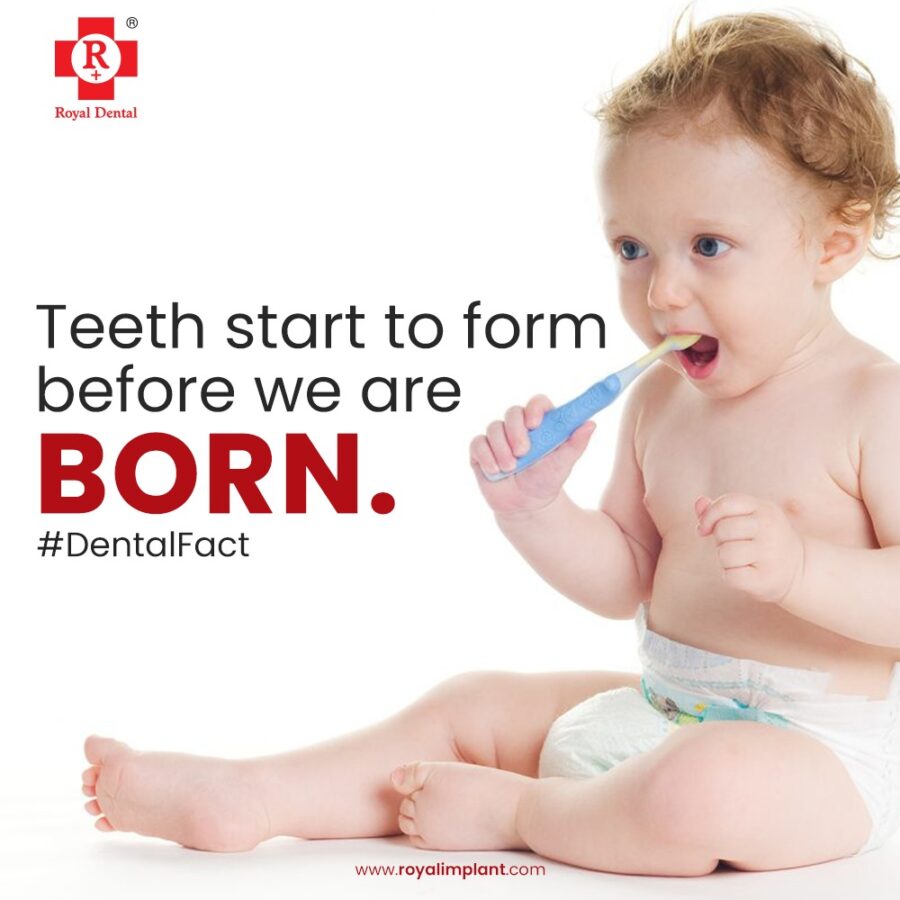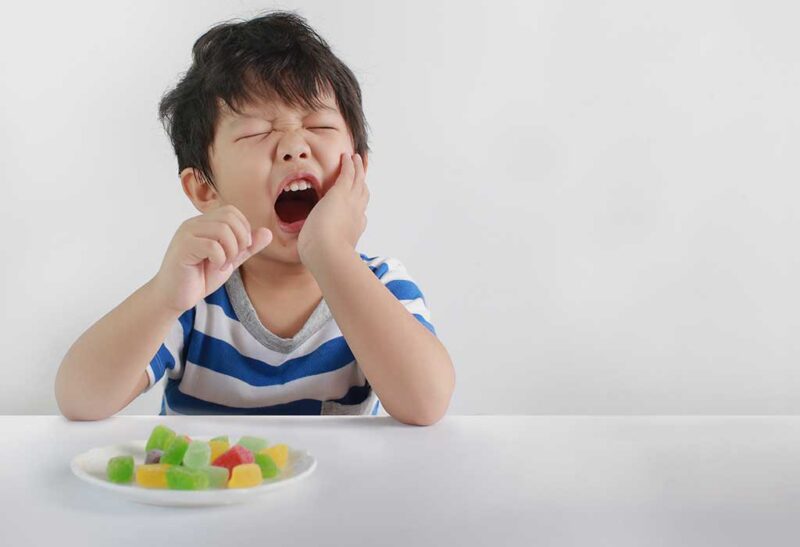You have found the Royal Dental Clinics’ blog, where we hope you can find useful dental information for our valued patients. In this article, Dr. Chirag Chamria, your trusted dentist, we will walk you through the essential issue of oral hygiene for kids and toddlers, focusing on the teeth and gum care.As parents, we want the best for our children, and their oral health plays a crucial role in their overall well-being. By establishing good dental habits early on, we can set the foundation for a lifetime of healthy smiles.
Arrival of First Tooth | Teeth and Gum Care
Your baby’s first tooth is a wonderful milestone. It’s the start of a lifetime of dental health and solid meals. Most infants obtain their first tooth between six and eleven months. Delayed tooth eruption is typical in some babies.
During this stage, you may notice certain signs that indicate your baby is teething. They may become irritable, drool excessively, experience swollen gums, and even have trouble sleeping. To alleviate their discomfort, there are a few simple steps you can take.

Gently massage their gums: Using a clean finger, you can massage your baby’s gums to provide some relief. Apply gentle pressure on the affected areas in a circular motion. This can help soothe their gums and alleviate the discomfort associated with teething.
Provide a chilled teething ring or cloth: Cold temperatures can help numb the gums and provide temporary relief. You can give your baby a teething ring that has been chilled in the refrigerator or a clean, damp cloth that has been placed in the freezer for a short period. Always ensure that the teething ring or cloth is clean and free from any potential hazards.
Use teething gels or medications cautiously: There are over-the-counter teething gels and medications available that claim to provide relief from teething discomfort. However, it’s important to consult with your pediatrician or dentist before using them. They can guide you on the appropriate use and ensure the product is safe for your baby.
Maintain oral hygiene even before the first tooth emerges: Good oral hygiene should start even before your baby’s first tooth appears. After feeding, you can gently clean their gums with a clean, damp cloth or gauze pad. This helps remove any residual milk or food particles from their mouth and keeps their gums healthy.
Introducing the Toothbrush | Teeth And Gum Care
Once that adorable tooth pops up, it’s time to introduce a toothbrush to your little one. Brushing their teeth is an essential part of their oral hygiene routine and helps keep their teeth and gums healthy. Here are some tips for introducing the toothbrush to your infant or toddler:
Choose the right toothbrush: Choose a baby toothbrush. Find a child-friendly soft-bristled brush. Their gums and teeth need mild bristles. Royal Dental Clinics may suggest a toothbrush for your child’s age and requirements.
Start with water: Start by brushing with water. Brush your child’s teeth in tiny circles with wet bristles. They become acclimated to brushing and prepare for toothpaste.

Gradually introduce toothpaste: Once your youngster is comfortable with the toothbrush, use a little smear of fluoride toothpaste. Use rice-sized toothpaste for babies and toddlers. Increase the toothpaste to a pea-sized quantity as they develop and can spit it out.
Brush twice a day: Brush your child’s teeth twice daily. After breakfast and before bed, wash teeth. Regularity keeps teeth healthy and avoids cavities.
Make it a fun and interactive experience: Children should love brushing. Play their favorite music or use a timer to make brushing enjoyable. A toothbrushing song or sticker chart might help spice up the process.
Lead by example: It’s crucial to demonstrate proper dental hygiene for kids since they copy their parents. Make cleaning teeth a family activity. Brushing jointly promotes dental hygiene and a healthy smile.

Transition to Solid Foods | Teeth And Gum Care
During the transition to solid foods, it is crucial to be mindful of the types of foods you introduce to your child. Limiting sugary foods and drinks is essential for their dental health. Sugars can contribute to tooth decay, so it’s best to prioritize nutritious options like fruits, vegetables, whole grains, and lean proteins. Introducing a variety of flavors and textures will help expand your child’s palate and support their overall development. Remember to avoid putting your child to bed with a bottle or sippy cup filled with anything other than water to prevent early childhood cavities.
Regular Dental Visits | Teeth And Gum Care
Early detection and prevention: Regular dental checkups let us track your child’s oral growth. We can detect dental decay, gum disease, and poor bite alignment early. We can act early to prevent oral health concerns from worsening.
Personalized guidance: As your child’s dentist, I can provide customized dental advice. I can answer any questions you have regarding their dental health, teething, food, thumb-sucking, or other behaviors. We may maximize home oral care by knowing your child’s particular circumstances.
Preventive treatments: We can safeguard your child’s teeth and gums with dental appointments. Professional cleanings, fluoride treatments, and dental sealants may be used. These precautions may greatly minimize the risk of cavities and other oral health issues.
Establishing a positive dental experience: Early dentist appointments help your kid become comfortable with dental treatment. Royal Dental Clinics creates a warm, friendly, and inviting environment to help your kid feel at ease.
Education and guidance for parents: Your child’s dental health benefits you as a parent. I can teach you about oral hygiene, age-appropriate dental care, and nutrition to promote your child’s dental health during these sessions.
Building Oral Hygiene Routines | Teeth And Gum Care
Start early: When your child’s first tooth emerges, start oral hygiene. After feedings, carefully wipe their gums. Getting your kid used to dental care early offers a good example.
Brush twice a day: Your youngster should clean their teeth twice a day, ideally after breakfast and before sleep. Brushing for two minutes each time cleans thoroughly. Play their favorite music or set a timer to make it enjoyable and participatory.
Lead by example: Parenting teaches kids. Brushing with your kid demonstrates the significance of oral hygiene. Show them how to brush and underline its importance.
Make it fun: Enjoy brushing. Use character-themed toothbrushes. Sing tunes or make brushing enjoyable. Use rewards or stickers to promote participation and consistency.
Supervise and assist as needed: Your youngster may require help brushing depending on age and motor abilities. Make sure they wash their teeth properly and cover all regions. Allow them to brush under your supervision as they become better.
Introduce flossing: Floss when your child’s teeth contact, generally around two. Use kid-friendly flossers or picks. Show them how to floss softly between teeth to eliminate food and plaque.
Reinforce the importance of healthy habits: Teach your youngster how a balanced diet influences dental health. Promote fruits, vegetables, and water over unhealthy snacks and beverages. Encourage children to drink water throughout the day to remove germs and moisten their mouths.
Encouraging Healthy Habits | Teeth And Gum Care
Promoting health involves more than simply recommending good dental hygiene. It entails doing everything you can to improve your kid’s health in general. In addition to helping kids grow and develop normally, a diet high in fruits, vegetables, and whole grains may also benefit their teeth. Restrict sugary beverages and food and provide more wholesome alternatives. Regular exercise and enough fluid intake should also be emphasized. The foundation for a lifetime of health and happiness may be laid with the instillation of these behaviors from an early age.

Dealing with Dental Emergencies | Teeth And Gum Care
Dealing with dental emergencies can be stressful, but being prepared can make all the difference. If your child experiences a dental emergency, such as a knocked-out tooth, a severe toothache, or a broken tooth, it’s important to remain calm. Contact Dr. Chirag Chamria immediately for guidance. In the meantime, you can gently clean the affected area with warm water and apply a cold compress to reduce swelling. Avoid giving your child aspirin directly on the tooth or gums, as this can cause harm. Remember, swift action and professional dental care can help alleviate pain, prevent further damage, and ensure the best outcome for your child’s dental health.
Conclusion
Congratulations on taking the first steps toward ensuring your child’s oral health! By following these guidelines for teeth and gum care, you are providing your little one with a strong foundation for a lifetime of healthy smiles. Remember, Dr. Chirag Chamria and the caring team at Royal Dental Clinics are here to support you every step of the way. Together, we can help your child embrace oral hygiene and maintain a bright and healthy smile for years to come. Stay proactive, stay positive, and let’s nurture those precious smiles together!
© All rights reserved by Royal Dental Implants Pvt Ltd
Issued in public interest






